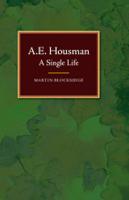
Sussex Academic Press (2016) p/b 295pp £27.50 (ISBN 9781845197612)
There are in existence some dozen biographies of A. E. Housman, in addition to complete and scholarly editions of his poems and letters, detailed individual studies of his poetry, classical scholarship, sexuality, and landscape, thorough investigations (especially by Paul Naiditch) into various aspects of his life—and much more besides. What need can there be for a new biography?
B. gives the answer in his title: it is his contention that there are no more ‘two separate Housmans’ (scholar and poet) than there are two separate Larkins (librarian and poet). Housman, says B., ‘did not see himself primarily as a poet: he saw himself as a scholar who had occasionally written poetry’, and this biography ‘seeks to reflect that fact’. B. gives more prominence to the role of Moses Jackson than has been possible before, and he has had the benefit of recent work by, especially, Paul Naiditch and David Butterfield, but there are no startling new insights. Your reviewer was interested by the details of Housman’s tutoring at Oxford—disgracefully neglectful—and the minutiae of his life are given enough attention to give colour to the work as a whole. B. brings out well how Housman’s sister Kate and his, shall we say, egregious biographer Grant Richards did their best to conceal their almost certain knowledge of Housman’s homosexuality, as indeed was understandable in the climate of the day: in the case of his brother Laurence, equally aware, and also homosexual, the position is broadly similar, if rather more complicated.
Newcomers to Housman’s life will find this a worthwhile introduction, and quotations from the poetry are notably generous (from the prose, much less so: this is not a book which attempts to look at Housman’s contribution to classical scholarship). Housman notoriously said that ‘accuracy is a duty, not a virtue’, and he would not have welcomed the misspellings of the title of a play of Euripides (Hippolitus) and a manuscript of Catullus (Veroniensis); he would have been angered by a (well-nigh nonsensical) misprint in a quotation from a poem (‘ought’ for ‘aught’!); and how he would have felt to see his own words about Richard Bentley mangled by a bad misprint which it would have taken a Heinsius to correct (‘want’ for ‘wait’), one can only conjecture. ‘Half a crown’ is not 25 old pence, as alleged, but 30. There is a useful bibliography and a commendably detailed index.
Colin Leach
